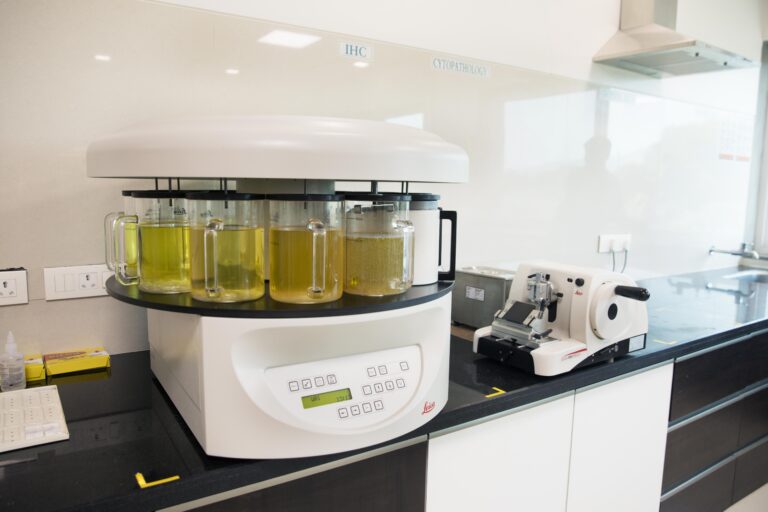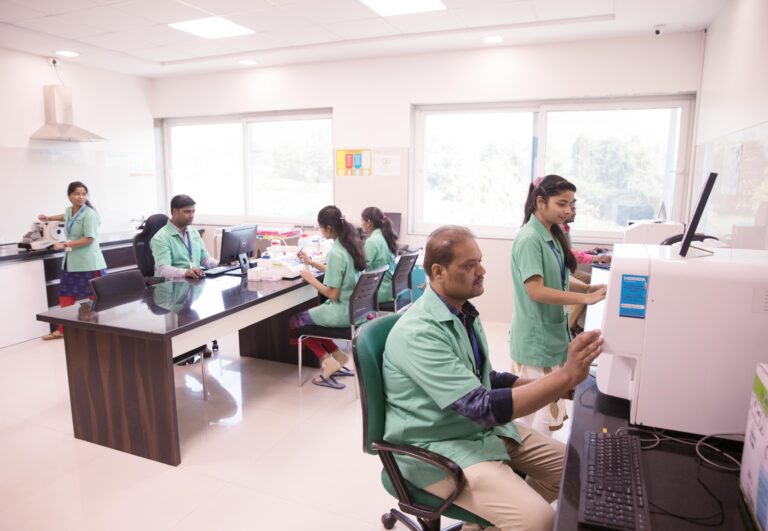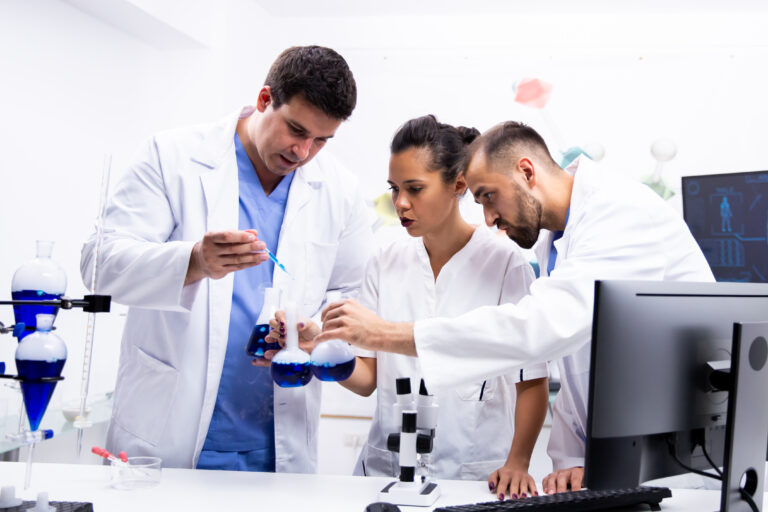Pathology Oncology in Satara
- Home
- Pathology Oncology in Satara



Onco-Life Pathology
Clinical Pathology is a vital part of modern healthcare that helps in identifying diseases by testing samples of blood, urine, tissues, and other body fluids. At Onco-Life, our Clinical Pathology department acts as the backbone of diagnosis and patient monitoring, working behind the scenes to support doctors in providing the best possible care.
Scope of Clinical Pathology
Clinical pathology covers many types of tests that give doctors important information about your health. It includes:
- Haematology: Study of blood and its disorders such as anaemia, leukaemia, and clotting issues.
- Clinical Chemistry: Checks body fluids like blood and urine to understand how organs like the liver, kidneys, and heart are working.
- Microbiology: Detects infections caused by bacteria, viruses, fungi, or parasites.
- Immunopathology: Examines how your immune system is functioning—especially for allergies, autoimmune diseases, or weak immune systems.
- Cytology and Histopathology: Looks at cells and tissues to detect abnormalities, including cancer.
Core Functions of Clinical Pathology
- Diagnosing Diseases: Helps find the root cause of health problems with tests like blood counts or urine analysis.
- Monitoring Progress: Tracks chronic diseases like diabetes or kidney issues over time to ensure they are under control.
- Checking Treatment Success: Confirms if medications or therapies are working, such as after chemotherapy or antibiotics.
- Preventive Healthcare: Routine check-ups can catch problems early before symptoms appear, improving your chances of staying healthy.
Key Diagnostic Techniques in Clinical Pathology
- Biochemical Tests:
- Measure sugar, cholesterol, liver and kidney functions to detect early signs of problems.
- Microscopy:
- Used to spot infections or abnormal cells by viewing samples under a microscope.
- Culture Tests:
- Help find the exact germ (like bacteria) causing an infection and choose the right treatment.
- Blood Tests:
- CBC (Complete Blood Count): Shows overall health status and detects disorders like anaemia or infections.
- Clotting Tests: Check how well your blood is clotting, useful for bleeding or clot-related problems.
- Molecular Testing:
- Advanced methods like PCR to identify viruses (e.g., COVID-19), genetic disorders, or even certain cancers.
- Immune Testing:
- Detects the presence of antibodies or immune reactions to help diagnose conditions like allergies or autoimmune diseases.
Common Diseases Diagnosed by Clinical Pathology
- Infections:
- Pathology helps detect infections like pneumonia, UTIs, or sepsis using urine, blood, and other body samples.
- Metabolic Problems:
- Tests like blood sugar and cholesterol help diagnose diabetes or heart risk early.
- Liver & Kidney Disorders:
- Liver function tests (LFTs) and kidney function tests (KFTs) give vital clues about organ health.
- Autoimmune Diseases:
- Special antibody tests help find conditions like lupus or arthritis.
- Cancer:
- Tumour markers in the blood help in early detection and monitoring treatment progress.
Advancements in Clinical Pathology
- Automated Testing:
- Machines now do many tests faster and more accurately than before.
- Point-of-Care Testing:
- Small portable devices give instant test results in clinics or remote areas.
- Genetic & Molecular Testing:
- Helps in personalized treatment plans by detecting unique disease traits.
- Artificial Intelligence (AI):
- AI tools help pathologists make faster, more accurate decisions using smart data analysis.
Challenges in Clinical Pathology
- Maintaining Quality:
- Ensuring tests are always accurate and consistent across labs.
- New Diseases:
- Pathology needs to adapt quickly to new diseases like COVID-19 or drug-resistant infections.
- Data Integration:
- Connecting lab results with patient history and clinical information to offer holistic care.
Future of Clinical Pathology
The future of pathology is bright—with new technologies, faster testing, and more personalized treatments. Innovations like AI, next-gen sequencing, and digital pathology will transform how diseases are diagnosed and treated.
At Onco-Life Cancer Centre, our Clinical Pathology services are aligned with global standards and are a key support pillar in cancer care, working hand-in-hand with imaging and oncology services to ensure every patient receives timely, accurate, and personalized treatment.
Most Popular Questions
Satara – Clinical Pathology – Frequently Asked Questions (FAQs)
1. What is Clinical Pathology?
Clinical pathology involves testing blood, urine, and other body fluids to diagnose and monitor diseases, especially cancer. It helps doctors understand what’s going on inside your body.
2. Why are lab tests important in cancer treatment?
Lab tests help doctors diagnose cancer, check how far it has spread, monitor treatment progress, and watch for side effects of chemotherapy or other therapies.
3. What kind of tests are done in clinical pathology?
Common tests include:
- Blood tests (CBC, ESR, liver/kidney function)
- Urine tests
- Biochemical tests
- Hormone levels
- Infection screening
- Tumor markers
4. What is a Complete Blood Count (CBC)?
CBC checks the number and quality of red cells, white cells, and platelets. It helps detect anemia, infections, or bleeding problems, which are common during cancer treatment.
5. Why do I need repeated blood tests during cancer treatment?
Cancer treatments like chemotherapy can affect blood cells. Repeated tests help doctors adjust treatment safely and detect problems early.
6. What are tumor marker tests?
Tumor markers are substances made by cancer cells. They help in:
- Detecting cancer
- Monitoring treatment response
- Checking if cancer has returned
Examples: PSA (for prostate), CA-125 (for ovarian), CEA (for colon).
7. How are pathology samples collected?
Samples like blood, urine, or sputum are collected by trained technicians. Sometimes, doctors may collect tissue or bone marrow samples using small procedures.
8. Are pathology tests painful?
Most tests like blood draws or urine samples are not painful. For procedures like biopsies or bone marrow tests, local anesthesia is given to minimize discomfort.
9. What is a biopsy and why is it important?
A biopsy is the removal of a small piece of tissue to check for cancer or abnormal cells under a microscope. It helps in confirming the type and grade of cancer.
10. How long do pathology test results take?
Routine test results are ready in a few hours to a day. Specialized tests like biopsy or genetic tests may take 3–7 days.
11. Can blood tests detect cancer?
Not always. Blood tests support diagnosis but can’t confirm all cancers. They’re usually combined with scans or biopsies.
12. What are histopathology and cytopathology?
- Histopathology: Study of tissues (like from a biopsy).
- Cytopathology: Study of individual cells (like from a fine needle aspiration – FNAC).
Both help in detecting cancer at a cellular level.
13. Why is urine tested in cancer patients?
Urine tests check for infections, kidney function, and signs of cancer spread or treatment side effects.
14. What is a bone marrow test?
It’s a test where a small sample of bone marrow is taken, usually from the hip bone, to check for blood cancers like leukemia or lymphoma.
15. Can a blood test show if chemotherapy is working?
Yes. Blood tests can indicate whether cancer cells are reducing and whether your body is handling chemotherapy well.
16. What happens if my blood counts are low?
You may feel tired, bruise easily, or get infections. Your doctor may pause treatment, give medicines, or blood transfusions based on your pathology reports.
17. Are all tests done at the hospital lab?
Most tests are done in-house at Onco-Life’s pathology lab. Some specialized or genetic tests may be sent to partner labs with faster processing.
18. What is molecular pathology?
It involves studying genes and DNA to detect cancer or understand how your tumor behaves. It helps personalize treatment.
19. Do pathology reports help in choosing treatment?
Yes. Pathology reports confirm the diagnosis, cancer stage, type, and response, which guides the doctor in selecting the best treatment.
20. Is fasting required for pathology tests?
Some tests like glucose, cholesterol, or liver function require fasting for 8–10 hours. Your doctor or lab team will inform you beforehand.
21. Are reports available digitally?
Yes. Onco-Life Cancer Centre provides reports via SMS, email, or patient portal for easy and secure access.
22. Can errors happen in lab reports?
At Onco-Life, we follow strict quality control and NABL guidelines to ensure accuracy. However, in rare cases, re-tests may be advised for confirmation.
23. What is flow cytometry used for?
Flow cytometry is a specialized test to analyze blood or bone marrow cells, mainly for diagnosing blood cancers like leukemia and lymphoma.
24. Why are pathology tests repeated during follow-up?
Regular testing helps ensure cancer hasn’t returned, and that organs (like liver, kidneys) are functioning well post-treatment.
25. How is Onco-Life Clinical Pathology different?
Our lab is equipped with advanced technology, skilled pathologists, and round-the-clock services, ensuring timely, accurate, and cancer-focused diagnostics.
